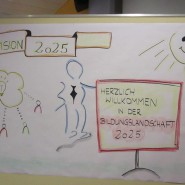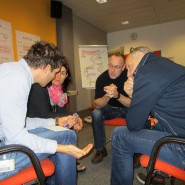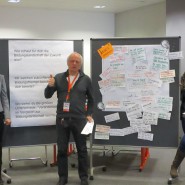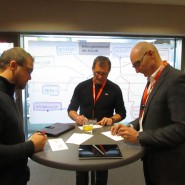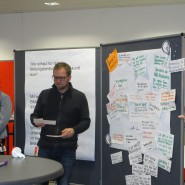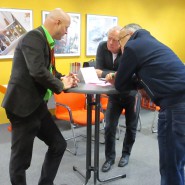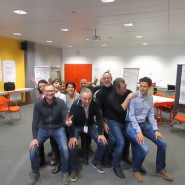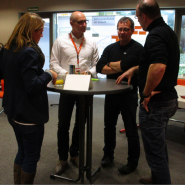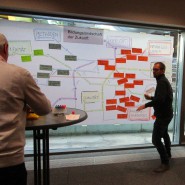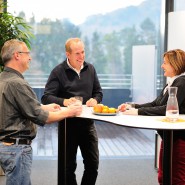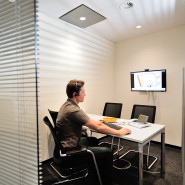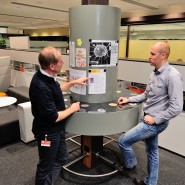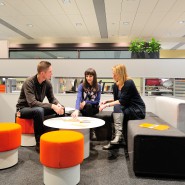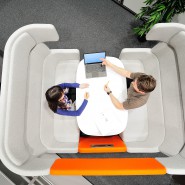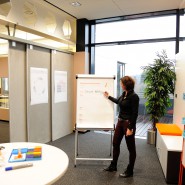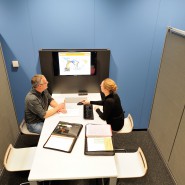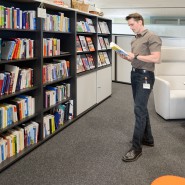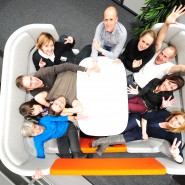Trainer Meeting 2015
Published on 11. March 2015
Trainers are important partners who help us promote the personal and professional further development of our employees. For this reason we organized a meeting with external and several internal trainers in February 2015. The event not only gave everyone the opportunity to get to know each other and exchange ideas, it also served as a think tank day to intensively discuss the challenges of the training landscape of tomorrow. We jointly developed impulses for our future collaboration. (Editing Team)
Goodies for Chinese New Year
Published on 9. March 2015
 During my visit at Blum Singapore mid February it was obvious that Chinese New Year is about to come. Piles of boxes and cans with cookies were in the appropiate decorated showroom – all of them small presents for customers for Chinese New Year. To the delight of all BIC colleagues the Team in Singapore presented us a few cans of delicious cookies. This allowed us far away from all organised festivities to welcome the Chinese New Year in our office and to celebrate with them even in Austria. (Ruth Kalb)
During my visit at Blum Singapore mid February it was obvious that Chinese New Year is about to come. Piles of boxes and cans with cookies were in the appropiate decorated showroom – all of them small presents for customers for Chinese New Year. To the delight of all BIC colleagues the Team in Singapore presented us a few cans of delicious cookies. This allowed us far away from all organised festivities to welcome the Chinese New Year in our office and to celebrate with them even in Austria. (Ruth Kalb)
Are You a Leader or a Manager? Why understanding the difference is important
Published on 5. December 2014
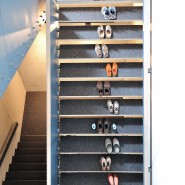
Developing both skills together with our clients is an interesting task of our daily business… (Editing Team)
The culture of meetings
Published on 3. December 2014
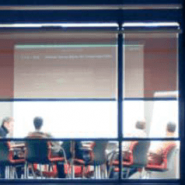 In our daily routine meetings are an important instrument to exchange information and to develop ideas together… As a matter of fact employees spend a lot of their time in jumping from one meeting to the next – more or less usefully. Therefore it’s necessary for the company to look critically at its own culture of meetings (Blum Magazine) and consider carefully the employee’s meeting habits from time to time. (Editing Team)
In our daily routine meetings are an important instrument to exchange information and to develop ideas together… As a matter of fact employees spend a lot of their time in jumping from one meeting to the next – more or less usefully. Therefore it’s necessary for the company to look critically at its own culture of meetings (Blum Magazine) and consider carefully the employee’s meeting habits from time to time. (Editing Team)
Office concept “Smart Working”
Published on 21. June 2014
Spaces, which adapt to people … change perspectives and create a new freedom. With this in mind, we developed the concept for our new office design. We were eagerly waiting to move in to our new premises and questioning ourselves how the concept could be implemented in daily practice. In March 2014 time had finally come. Meanwhile we have made our first steps in the new environment. Read on
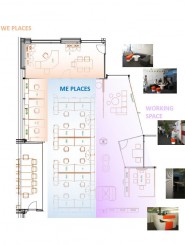
“A future-oriented office provides a spatial environment and a technical infrastructure, which enables employees to optimally unfold their performance potential, whereas the physical and mental health remains unharmed. The workplace is flexible, so it can be adapted to changing requirements of the organization “- Schwehr, Peter: Research Project on Human building, Lucerne 2009 –
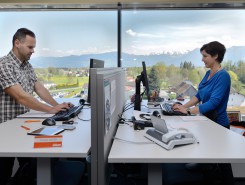 We places … this area is reserved for our flexible workplaces. They are assigned to team members, who are often traveling on business. During their absence, these workplaces can be used by all other employees at any time.
We places … this area is reserved for our flexible workplaces. They are assigned to team members, who are often traveling on business. During their absence, these workplaces can be used by all other employees at any time.
This of course requires a “clean desk approach” and the willingness of the team to consciously break up with habits and to use other locations for working.
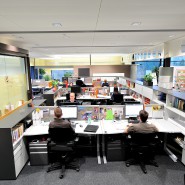 Me places … here are the fixed workplaces of our team members. Through the clearly structured arrangement and the separation from the open communication zone, we wanted to create a space for quiet and concentrated work in this area.
Me places … here are the fixed workplaces of our team members. Through the clearly structured arrangement and the separation from the open communication zone, we wanted to create a space for quiet and concentrated work in this area.
Working space … this is our creative open work and communication area. The different zones offer various options to choose the work environment according to our needs, may it be for a short chat, exchange of ideas, working out concepts or the preparation of a workshop.
When we implemented the “Smart Working” concept, we had to think in new directions and be open to try different ways of working. After a short adaptation phase we felt at home in the new environment. We more and more appreciate and make use of the potential to choose our workplace in the different zones according to our tasks and individual requirements. This experience is very much in line with the original intention that spaces, which adapt to people change perspectives, create freedom and have a positive influence on the working climate and the quality of work. (Editing Team)
Close
